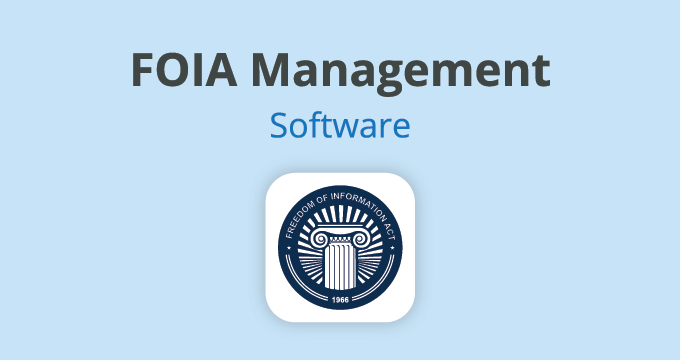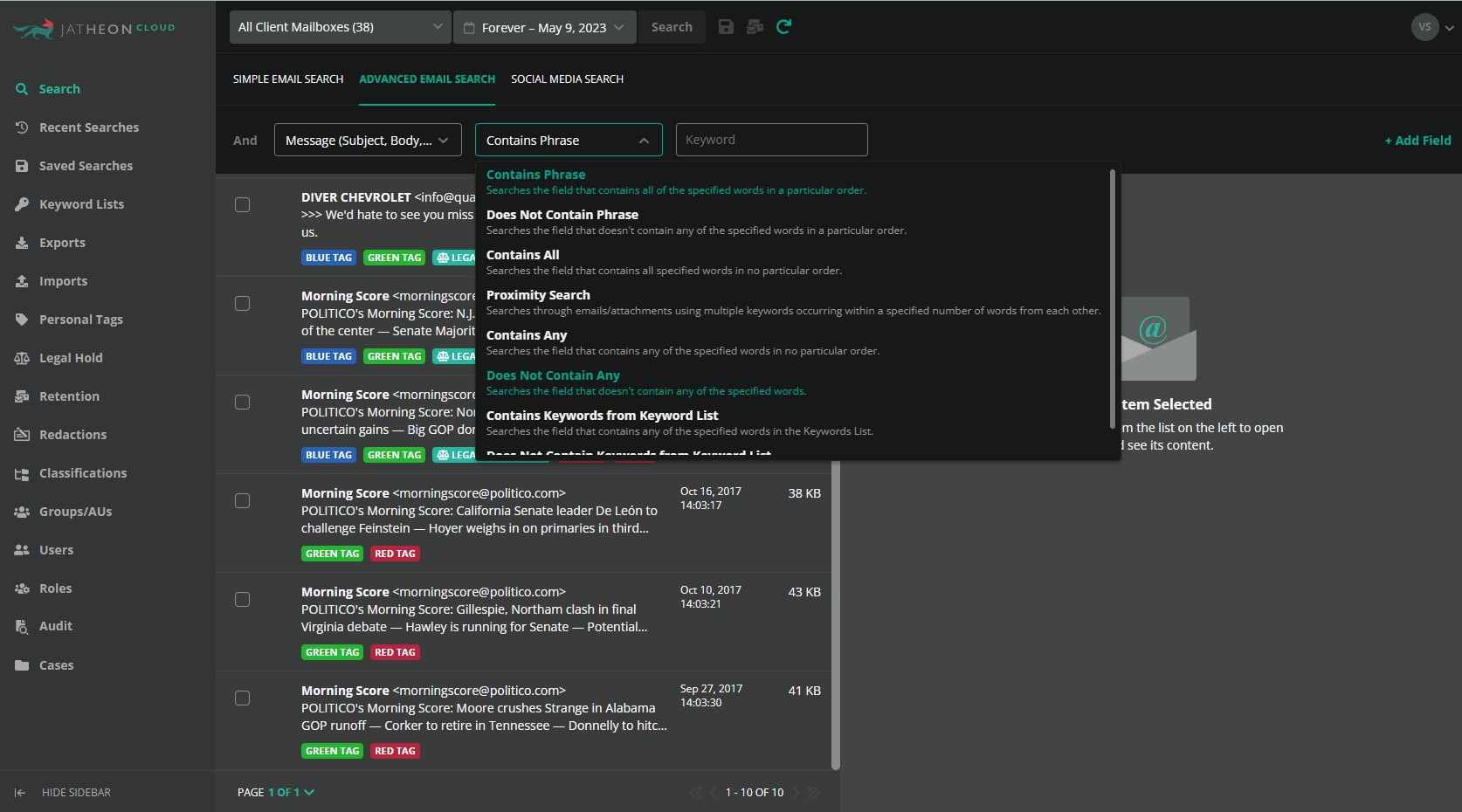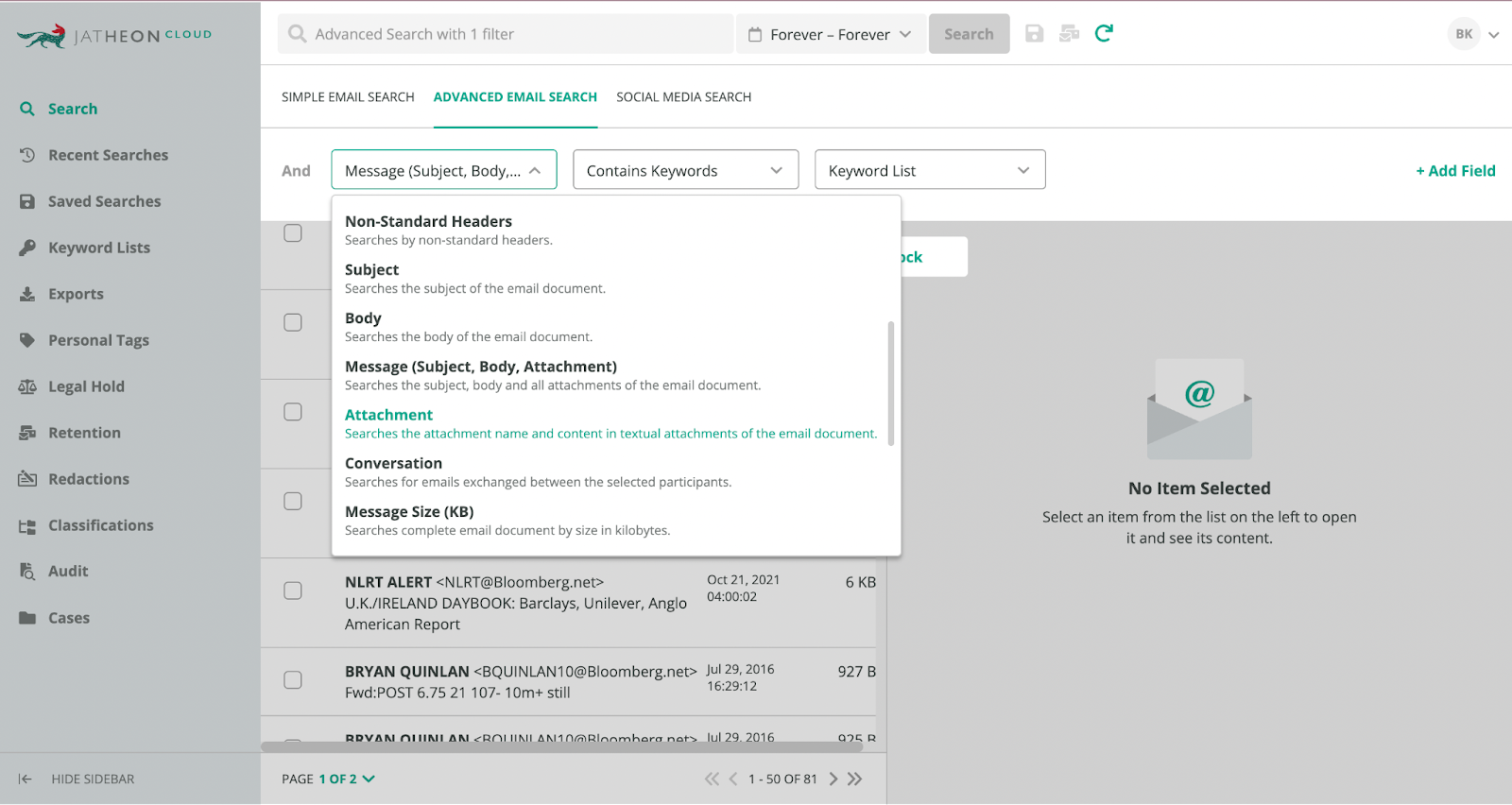Transparency is a fundamental part of how any government should demonstrate responsibility and accountability.
FOIA is the legislation that helps bridge the gap between government and the public through data transparency.
However, as communication channels expand and the volume of records increases, agencies are finding it harder to manage FOIA compliance effectively.
In this article, we’ll explore:
- What is FOIA
- What FOIA software does and why it matters
- Key FOIA requirements that affect every federal agency
- Ways Jatheon helps agencies simplify compliance and improve transparency
What Is FOIA?
The Freedom of Information Act (FOIA) is a United States federal law that grants the public the right to request access to records from any federal agency.
It was enacted in 1966 and designed to promote government transparency by allowing anyone to obtain non-exempt information from the government via FOIA requests.
Any U.S. citizen or organization can submit a FOIA request, and each federal government agency will have its own process for handling them.
It’s important to underline that FOIA applies only at the federal level.
State and local agencies are subject to their own public records laws, often referred to as Sunshine Laws, which vary in scope, timelines, and exemptions.
Challenges of Staying FOIA Compliant
One of the most demanding requirements under FOIA is an agency’s ability to locate, review, and deliver requested records within the required timeframe, which is typically 20 business days.
While this sounds straightforward, the actual execution is often anything but.
Federal agencies routinely receive hundreds, or even thousands, of FOIA requests each year.
Each FOIA request can involve large volumes of electronic records such as emails, chat logs, text messages, and even social media interactions. To comply, agencies must ensure those records are retained properly, can be searched quickly, and are delivered in a usable format, without exposing sensitive or exempt information
This presents several challenges for governments to stay FOIA compliant:
- Balancing transparency with legal and privacy obligations — Agencies must ensure public access while protecting personal data, law enforcement records, and other exempt information.
- Long-term retention of records — Federal recordkeeping rules require agencies to store data for years or even decades, depending on classification.
- Efficient search and retrieval — Manually locating data across multiple systems, formats, and departments is time-consuming and error-prone.
- Multichannel records production — FOIA requests may involve records from diverse communication tools, which must all be archived and accessible.
- Meeting statutory response deadlines — Delays can result in public complaints, legal action, and reputational damage.
Delivering data in acceptable formats — Records must be complete, legible, and sometimes machine-readable, depending on the request. - Applying accurate redactions — Sensitive information must be removed in accordance with FOIA exemptions, without compromising the rest of the record.
- Handling increasing request volumes — As public expectations grow, many agencies face limited resources and aging systems.
Even when records are retrievable, many agencies struggle to fulfill requests completely and within the required timeframe. Common issues include partially missing records, incompatible file formats, or inadequate redaction, all of which can result in non-compliance.
At the same time, agencies face mounting pressure from the public, journalists, and watchdog organizations demanding faster, more transparent access to government data. This has made FOIA compliance a top operational priority.
To solve these problems, a number of public records software solutions have been developed to reduce FOIA processing times, store data safely, and handle all compliance issues a government agency may have.
FOIA Requirements In Different Government Sectors
FOIA compliance is not determined by industry or sector, but by whether an entity is part of the federal government. The Freedom of Information Act applies exclusively to federal agencies, requiring them to disclose records upon request unless those records fall under specific exemptions.
State and local agencies, including public schools, state-run healthcare facilities, and municipal governments, are governed by state-level public records laws, which share similar goals but vary in requirements and response deadlines.
Below is a breakdown of how FOIA applies across various federal agencies involved in different sectors:
Federal education agencies
FOIA applies to federal departments such as the U.S. Department of Education and its sub-agencies. Requesters can seek access to records about:
- Education grant programs and federal funding allocations
- Agency communications and decision-making processes
- Oversight of state or local education compliance with federal standards
Note: Individual student records are protected under the Family Educational Rights and Privacy Act (FERPA) and are not accessible via FOIA.
Federal health agencies
Entities like the Centers for Disease Control and Prevention (CDC,) National Institutes of Health (NIH,) the U.S. Food and Drug Administration (FDA,) and the U.S. Health and Human Services (HHS) fall under FOIA’s scope. These agencies may receive FOIA requests involving:
- Public health research and policy documents
- Drug approval records and safety evaluations
- Pandemic response coordination and communications
- Federal inspection reports
Patient-level data and personal health information are strictly protected by the Health Insurance Portability and Accountability Act HIPAA and are exempt from disclosure.
Federal financial oversight agencies
Agencies such as the Securities and Exchange Commission (SEC,) the Federal Reserve, the Office of the Comptroller of Currency (OCC,) and the Federal Deposit Insurance Corporation (FDIC) are subject to FOIA. Requesters may access:
- Enforcement actions and investigation records
- Policy memos, rulemaking documentation, and meeting minutes
- Oversight reports on financial institutions
However, trade secrets, confidential supervisory information, and sensitive commercial data are exempt under FOIA (Exemption 4).
While FOIA governs federal agencies, financial services firms themselves are regulated separately. For example, broker-dealers must comply with FINRA and SEC Rule 17a-4, which impose strict requirements for electronic records retention, long-term archiving, and rapid retrieval during audits or examinations.
Although FOIA and FINRA differ in scope, they share common goals — ensuring accountability, transparency, and reliable access to records. The same technologies that support FOIA compliance, such as data archiving and redaction tools, can also help financial institutions meet FINRA requirements.
Administrative and regulatory agencies
Other agencies, such as the Department of Justice, the U.S Environmental Protection Agency (EPA,) Department of Homeland Security, or General Services Administration, must also comply with FOIA. Their records requests may involve:
- Internal communications
- Budget and procurement data
- Environmental compliance reports
- Policy directives and enforcement actions
Each agency maintains its own FOIA office and processes, but all must respond within the statutory timeframe unless an exemption applies.
What Is FOIA Management Software?
FOIA management software is a type of government software for public records, helping government agencies track, process, and respond to public records requests more efficiently and in compliance with the Freedom of Information Act. These tools streamline the request lifecycle — intake, tracking, search, redaction, and delivery — while ensuring sensitive information is properly managed.
These solutions are usually in the form of data archiving solutions with specific FOIA software features added to speed up the ediscovery process in the event of a FOIA request.
Their key features typically include:
- Centralized data archive — FOIA software serves as a centralized repository for your data across multiple channels.
- Data retrieval — Fast, granular search across large datasets speeds up the identification and retrieval of relevant records.
- Collaborative systems — Enable compliance, legal, and IT teams to work together on reviews, redactions, and approvals within a shared platform
- Redaction — Automate or assist with the removal of exempt information before releasing records to the public.
- System integration — FOIA software easily integrates into your existing archive or easily migrates it to its own archiving server.
- Security — Encrypted storage and role-based permissions ensure that only authorized staff can access sensitive data.
- Legal hold capabilities — FOIA software can preserve specific records by placing them on hold, ensuring they cannot be altered or deleted until the request or case is resolved.
By reducing manual work and improving accuracy, FOIA public records management software helps agencies meet legal deadlines, respond more consistently, and better manage growing volumes of public records requests.
Jatheon is one of the top vendors in this space, offering archiving and compliance tools with features specifically designed to support FOIA response workflows.
Let’s take a look at how it works.
How Jatheon’s FOIA Software Facilitates Compliance
Jatheon is a cloud-based archiving software built for compliance and FOIA request management in regulated industries.
It is an easy-to-use FOIA management software that lets you automatically capture communication from different channels and easily produce communication records for your FOIA requests.
Let’s go over why Jatheon makes a great FOIA management software:
- Automated record capturing, archiving, and storage — Jatheon automatically captures all of your electronic communications channels like, email, text messages, chat apps, or social media. It then houses them in a centralized archive in the original format with their metadata included. Captured records are preserved in a tamper-resistant archive with full metadata, maintaining record integrity and audit trails.
- AI classification and categorization — Archived content can be labeled, categorized, or tagged (manually or via automated rules) to facilitate organization and retrieval.
- Quick record retrieval — Jatheon’s easy-to-use FOIA software comes with robust but intuitive advanced search capabilities. This simplifies the records retrieval process as it’s possible to perform searches based on different criteria, including the name, email address, domain, participants in a conversation, keywords, phrases, and labels. Also, Boolean, fuzzy, wildcard, and proximity operators are used to refine the search and locate the relevant information.
- Redaction support — Instead of going through each record and hiding sensitive information manually, Jatheon comes with an integrated redaction tool that automates the redaction process and can be used to redact specific information on individual records or in bulk.
- Export and output flexibility — You can select file types (e.g., PDF, EML, PST) and package attachments or threaded content for release. Some workflow automation may assist in generating the response package.
- Secure communications — Jatheon’s FOIA software provides enterprise-level security to meet strict regulatory requirements. All records are stored in the cloud with encryption, protected by two-factor authentication, geofencing, and full alignment with AWS security best practices.
- Storage scalability — To accommodate the massive volume of data your government agency needs to store, Jatheon offers unlimited storage and scalability (the system is AWS-based).
- Certifications and availability — Jatheon Cloud comes with all the necessary safeguards, data privacy features, certifications, SLA, all backed up by AWS as the number one cloud storage provider offering industry-leading scalability, data availability, security, and performance.
If your agency is looking for a reliable way to manage FOIA requests, ensure records retention compliance, and streamline redaction, contact us at sales@jatheon.com or book a demo to see how Jatheon’s FOIA software can support your compliance goals.
Summary of the Main Points
- The Freedom of Information Act (FOIA) applies only to U.S. federal agencies, granting citizens and organizations the right to access government records unless exempt. State and local agencies follow their own public records laws, often called Sunshine Laws.
- Agencies must respond to FOIA requests within 20 business days, but high request volumes, multichannel communications, and limited resources make this difficult.
- Common hurdles include long-term records retention, fast retrieval, proper redaction, acceptable formats, and meeting strict deadlines under heavy scrutiny from the public and media.
- FOIA applies across federal education, health, financial, and regulatory agencies, with exemptions like FERPA, HIPAA, and trade secret protections limiting what can be released.
- While FOIA applies to federal regulators like the SEC or Federal Reserve, financial firms are separately regulated by FINRA and SEC Rule 17a-4, which also require strict archiving and retention.
- FOIA management software streamlines intake, tracking, redaction, and delivery of records, helping agencies meet deadlines and improve efficiency.
- Common features of FOIA public records software include centralized archiving, advanced search, collaboration tools, redaction, system integration, legal hold, and enterprise-grade security.
FAQ
What is FOIA redaction software and why is it important for compliance?
FOIA redaction software is a tool that helps government agencies remove sensitive or exempt information, such as personal data, law enforcement details, or trade secrets, before releasing records to the public. Using automated redaction features ensures faster responses, reduces human error, and supports compliance with FOIA’s strict exemptions.
How does public records sofware support government transparency?
Public records software allows agencies to store, manage, and retrieve large volumes of records efficiently. By centralizing communication records like emails, texts, and social media, agencies can process requests faster and provide consistent, accurate responses, which strengthens transparency and public trust.
What role does FOIA records retention compliance play in request management?
FOIA records retention compliance ensures that agencies preserve records for the legally required duration, sometimes spanning decades. Proper retention policies prevent records from being lost or deleted prematurely and guarantee that requested materials can be retrieved when needed.
Can FOIA request software for school emails improve compliance in education?
Yes. While K-12 schools fall under state-level public records laws, federal education agencies and some state oversight bodies benefit from FOIA request software for school emails. These tools allow administrators to search, archive, and redact email communications efficiently, while also ensuring compliance with FERPA protections for student records.










